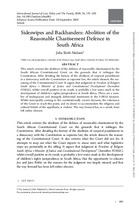| dc.contributor.author | Julia, Sloth-Nielsen | |
| dc.date.accessioned | 2021-07-23T11:50:04Z | |
| dc.date.available | 2021-07-23T11:50:04Z | |
| dc.date.issued | 2020 | |
| dc.identifier.citation | International Journal of Law, Policy and the Family, Volume 34, Issue 2, August 2020, Pages 191–203, https://doi.org/10.1093/lawfam/ebaa005 | en_US |
| dc.identifier.issn | 1360-9939 | |
| dc.identifier.uri | http://hdl.handle.net/10566/6440 | |
| dc.description.abstract | This article reviews the abolition of the defence of reasonable chastisement by the South African Constitutional Court on the grounds that it infringes the Constitution. After detailing the history of the abolition of corporal punishment in a democracy with the Constitution as supreme law, the article dissects the reasoning of the Constitutional Court. It argues that judgment in Freedom of Religion South Africa v Minister of Justice and Constitutional Development (hereafter FORSA), whilst overall positive in its result, is probably a low water mark in the development of children’s rights jurisprudence in South Africa. There are a number of inadequacies and strangely deferential statements in the FORSA decision. Whilst inescapably coming to the constitutionally correct decision, the reluctance of the Court to reach this point, and its desire to accommodate the religious and cultural beliefs of the appellants, is evident. The way forward has, as a result, been left rather obscure. | en_US |
| dc.language.iso | en | en_US |
| dc.publisher | International Journal of Law, Policy and the Family | en_US |
| dc.subject | South African Constitutional Court | en_US |
| dc.subject | Sideswipes | en_US |
| dc.subject | Backhanders | en_US |
| dc.title | Sideswipes and Backhanders: Abolition of the Reasonable Chastisement Defence in South Africa | en_US |
| dc.type | Article | en_US |

